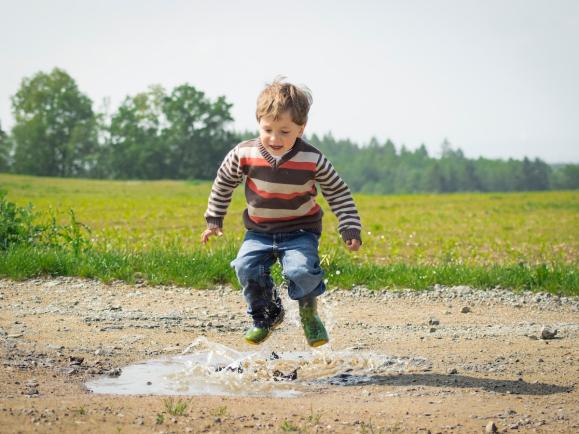
Rough play is an essential part of a child's development, often overlooked in society. It is integral to a child's physical, cognitive, and social development, teaching them essential life skills like problem-solving and interacting with peers. Let's explore why rough play is vital for children and how it can help shape their futures.
What is rough play?
Rough play, or rough-and-tumble play, is a form of physical play between two or more people that involves pushing, wrestling, chasing and other physical activities. It is often seen among kids roughhousing in the playground or during recess at school. Despite its seemingly chaotic nature, rough play is good for your kids and benefits their development in multiple ways. Rough play can include playful aggression such as tackling, pinching and punching, but it should never involve intentional harm or violence. Violent play in early childhood should continually be monitored and discouraged. However, children learn important social skills through rough play, like self-regulation, conflict resolution and cooperation.
Why is rough play important?
Rough play is vital to childhood development and can help children learn valuable skills. Kids can learn physical coordination, communication, cooperation, problem-solving, negotiation, and conflict resolution through roughhousing. This playful aggression is also beneficial for teaching kids how to express themselves emotionally and manage their emotions. Rough play allows kids to practice regulating their impulses in a safe, fun environment and helps them learn to take risks and accept the consequences of their actions. Overall, rough play is good for your kids and helps promote healthy and well-rounded development.
What are the benefits of rough play?
Rough play, also known as kids roughhousing, is an important activity for children. It allows them to express their feelings and physical energy in a safe and supervised environment. Rough play also benefits children's development and growth, as it helps them learn necessary social skills, such as negotiation, cooperation, problem-solving, communication and empathy. In addition, rough play helps children become more confident and resilient, improving their physical health and strength.
There is no denying that rough play is good for your kids. It helps them build strong relationships with their peers, teaches them the concept of boundaries, and boosts their emotional intelligence. On the physical side, it can help kids develop coordination and agility, balance, and overall body strength. Rough play can also help children develop emotional control by teaching them how to manage their impulses and handle strong emotions. And, on a fun note, rough play can provide great entertainment for kids of all ages.
Overall, rough play is an essential part of any child's development. It offers a safe way for them to express their physical energy and emotions positively while also helping them learn necessary social and physical skills.
How can I encourage rough play?
As parents, it is vital to provide an environment that is conducive to rough play. Children need a safe place to explore their physical boundaries and develop motor, social, and problem-solving skills. The first step to encouraging rough play in your child is to create an environment that is safe for rough play. Ensure the area is clear of sharp objects or furniture that can cause injury. Also, ensure your child has the necessary safety equipment, such as a helmet or knee pads.
Next, demonstrate what is appropriate. Show your child the right way to engage in rough play, such as using safe arm and leg movements, not running into people, and taking turns. Then, you should provide toys and props for imaginative play. Having items that can help children create stories and scenarios to use in rough play can help them explore their physical boundaries safely.
Then, use positive reinforcement when needed. If your child follows the rules and engages in rough play safely, praise them for following the rules and playing safely. Finally, set age-appropriate limits. Explain to your child what activities are acceptable and off-limits for their age group. This will help keep them safe and help them stay within their physical boundaries.
Encouraging rough play in your child is vital for their physical, social, and cognitive development. By providing a safe environment and teaching your child how to engage in rough play, you can ensure they benefit from this activity.
How can I make sure my child is safe during rough play?
Rough play can be a great way to help children learn, grow, and have fun. However, it is crucial to ensure your child is safe while playing. The first tip to ensure your child's safety during rough play is to make sure the area is safe. Before allowing your child to engage in rough play, make sure the area is free from obstacles and dangers. Remove any sharp or dangerous objects and clear away any debris or clutter.
Next, set boundaries by letting your child know what is and isn't acceptable regarding play activities and behaviors. Make sure your child knows not to grab or pull too hard, use offensive language, and/or hurt someone else's feelings. Then, monitor the play. It's important to stay nearby and observe the space as it happens. Make sure there are no hazardous activities taking place and that everyone is having fun and getting along. If things start to get out of hand, intervene right away.
Then, use appropriate equipment. When engaging in physical activities, ensure your child wears protective gear such as helmets and knee pads. This can help prevent potential injuries. Finally, know your child's limits. Awareness of your child's abilities and physical limitations regarding playtime is essential. Don't push them to do something too difficult for them or beyond their capabilities.
By following these steps, you can make sure that your child remains safe and has a great time during rough play. With a few safety precautions in place, rough play can be an enjoyable experience for all involved.

